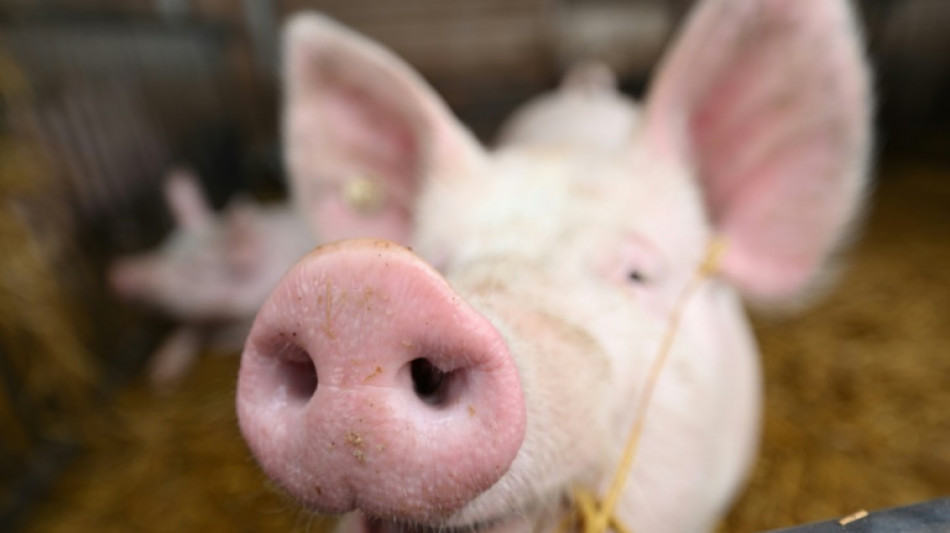
-
 Zuckerberg denies Meta bought rivals to conquer them
Zuckerberg denies Meta bought rivals to conquer them
-
Starc stars as Delhi beat Rajasthan in Super Over

-
 Weinstein asks to sleep in hospital, citing prison 'mistreatment'
Weinstein asks to sleep in hospital, citing prison 'mistreatment'
-
Amorim asks McIlroy to bring Masters magic to Man Utd

-
 Ruud keeps Barcelona Open defence on course
Ruud keeps Barcelona Open defence on course
-
Trump tariffs could put US Fed in a bind, Powell warns

-
 CONCACAF chief rejects 64-team World Cup plan for 2030
CONCACAF chief rejects 64-team World Cup plan for 2030
-
Putin praises Musk, compares him to Soviet space hero

-
 Son to miss Spurs' Europa League trip to Frankfurt
Son to miss Spurs' Europa League trip to Frankfurt
-
US senator in El Salvador seeking release of wrongly deported migrant

-
 Trump tariffs could put the US Fed in a bind, Powell warns
Trump tariffs could put the US Fed in a bind, Powell warns
-
US judge says 'probable cause' to hold Trump admin in contempt

-
 India opposition slams graft charges against Gandhis
India opposition slams graft charges against Gandhis
-
Nate Bargatze to host Emmys: organizers

-
 US Fed Chair warns of 'tension' between employment, inflation goals
US Fed Chair warns of 'tension' between employment, inflation goals
-
Trump touts trade talks, China calls out tariff 'blackmail'

-
 US judge says 'probable cause' to hold govt in contempt over deportations
US judge says 'probable cause' to hold govt in contempt over deportations
-
US eliminates unit countering foreign disinformation

-
 Germany sees 'worrying' record dry spell in early 2025
Germany sees 'worrying' record dry spell in early 2025
-
Israel says 30 percent of Gaza turned into buffer zone

-
 TikTok tests letting users add informative 'Footnotes'
TikTok tests letting users add informative 'Footnotes'
-
Global uncertainty will 'certainly' hit growth: World Bank president

-
 EU lists seven 'safe' countries of origin, tightening asylum rules
EU lists seven 'safe' countries of origin, tightening asylum rules
-
Chelsea fans must 'trust' the process despite blip, says Maresca

-
 Rebel rival government in Sudan 'not the answer': UK
Rebel rival government in Sudan 'not the answer': UK
-
Prague zoo breeds near-extinct Brazilian mergansers

-
 Macron to meet Rubio, Witkoff amid transatlantic tensions
Macron to meet Rubio, Witkoff amid transatlantic tensions
-
WTO chief says 'very concerned' as tariffs cut into global trade

-
 Sports bodies have 'no excuses' on trans rules after court ruling: campaigners
Sports bodies have 'no excuses' on trans rules after court ruling: campaigners
-
Zverev joins Shelton in Munich ATP quarters

-
 The Trump adviser who wants to rewrite the global financial system
The Trump adviser who wants to rewrite the global financial system
-
US senator travels to El Salvador over wrongly deported migrant

-
 UN watchdog chief says Iran 'not far' from nuclear bomb
UN watchdog chief says Iran 'not far' from nuclear bomb
-
Trump says 'joke' Harvard should be stripped of funds

-
 Macron vows punishment for French prison attackers
Macron vows punishment for French prison attackers
-
Canada central bank holds interest rate steady amid tariffs chaos

-
 Rubio headed to Paris for Ukraine war talks
Rubio headed to Paris for Ukraine war talks
-
Australian PM vows not to bow to Trump on national interest

-
 New attacks target France prison guard cars, home
New attacks target France prison guard cars, home
-
Global trade uncertainty could have 'severe negative consequences': WTO chief

-
 Google facing £5 bn UK lawsuit over ad searches: firms
Google facing £5 bn UK lawsuit over ad searches: firms
-
Onana to return in goal for Man Utd against Lyon: Amorim

-
 Tiktok bans user behind Gisele Pelicot 'starter kit' meme
Tiktok bans user behind Gisele Pelicot 'starter kit' meme
-
'Put it on': Dutch drive for bike helmets

-
 China's Xi meets Malaysian leaders, vows to 'safeguard' Asia allies
China's Xi meets Malaysian leaders, vows to 'safeguard' Asia allies
-
France urges release of jailed Russian journalists who covered Navalny

-
 Gabon striker Boupendza dies after 11th floor fall
Gabon striker Boupendza dies after 11th floor fall
-
UK top court rules definition of 'woman' based on sex at birth

-
 PSG keep Champions League bid alive, despite old ghosts reappearing
PSG keep Champions League bid alive, despite old ghosts reappearing
-
Stocks retreat as US hits Nvidia chip export to China


Chinese doctors implant pig liver in human for first time
Chinese doctors said Wednesday that they had transplanted a liver from a genetically modified pig into a brain-dead human for the first time, raising hopes of a live-saving donor option for patients in the future.
Pigs have emerged as the best animal organ donors, with several living patients in the United States having received pig kidneys or hearts in the last few years.
Livers have proved trickier -- and had not previously been tested out inside a human body.
But with a huge and growing demand for liver donations across the world, researchers hope that gene-edited pigs can offer at least temporary relief to seriously ill patients on long waiting lists.
Doctors at the Fourth Military Medical University in Xi'an, China, announced the field's latest breakthrough in a study in the journal Nature.
A liver from a miniature pig, which had six edited genes to make it a better donor, was transplanted into a brain-dead adult at the hospital on March 10, 2024, according to the study.
The trial was terminated after 10 days at the request of the family, the doctors said, adding that they had followed strict ethical guidelines.
- 'Bridge organ' -
The patient, whose name, gender and other details were not revealed, still had their original liver, receiving what is called an auxiliary transplant.
The hope is that this kind of transplant can serve as a "bridge organ" to support the existing liver of sick people waiting on a human donor.
Over the 10 days, the doctors monitored the liver's blood flow, bile production, immune response and other key functions.
The pig liver "functioned really well" and "smoothly secreted bile" as well as producing the key protein albumin, study co-author Lin Wang of the Xi'an hospital told a press conference.
"It's a great achievement" that could help people with liver problems in the future, he added.
Other researchers also hailed the breakthrough but emphasised that this early step could not confirm whether the pig organ would work as a replacement for human livers.
Transplants of livers have proved difficult because they carry out several different functions -- unlike hearts, for example, which simply pump blood, Lin said.
Livers filter the body's blood, breaking down things like drugs and alcohol, as well as producing bile that carries away waste and breaks down fats.
The pig liver produced far smaller amounts of bile and albumin than a human liver could achieve, Lin said.
More research is needed -- including studying the pig liver for more than 10 days, he added.
Next, the doctors plan to trial the gene-edited pig liver in a living human.
- 'Impressive' -
Oxford University transplantation professor Peter Friend, who was not involved in the study, said the results were "valuable and impressive".
However, "this is not a replacement for liver transplantation from human donors (at least in the near-term)," he told AFP in an email.
"This is a useful test of the compatibility of genetically modified livers with humans and points to a future in which such livers can provide support for patients in liver failure."
Lin emphasised that collaboration with US researchers was crucial.
"To be frank, we have learned quite a lot from all the research performed and investigated by the United States doctors," he said.
Last year, scientists at the University of Pennsylvania attached a pig liver to a brain-dead patient -- but instead of being transplanted, the organ remained outside the body.
Both US recipients of pig heart transplants died.
But Towana Looney, 53, is back home in Alabama after receiving a pig kidney on November 25, 2024.
U.Maertens--VB




